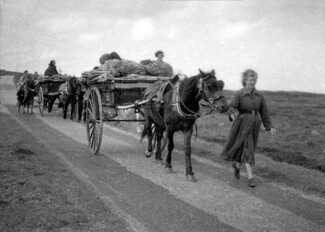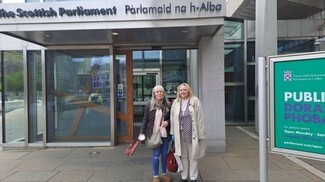“Tinker Experiments should not have happened” – Scottish Government apologises but yet to agree to reparations

The Scottish Government has finally apologised to the victims of the “Tinker Experiments” forced assimilation camps for Scotland’s Gypsy Travellers, which formed part of over a century of the “cultural genocide” conducted by the authorities against these people.
On the 25th of June inside the Scottish Parliament, First Minister John Swinney MSP said:
“The Tinker Experiments should not have happened. Those policies were wrong, and we recognise how much it is still hurting so many today. And more than anything else, I want to say this- on behalf of Scotland, we are sorry.”
The Tinker Experiments, which ran from the 1940s to 1980s, aimed to "settle" Travellers by forcing them to leave their lives on the road for permanent settlements. The experiment was to find out whether Scottish Gypsy Travellers could be forcibly assimilated if the nomadic part of their culture was removed by the authorities, alongside the ripping up of their extended family structures.
It involved parents being threatened with having their children taken from them and put into care if they refused to give up their traditional way of life and move into the Tinker Experiment camps.
The apology coincides with the publication by the Scottish Government of a long-awaited wide-ranging report on how the Scottish authorities tried to exterminate the Scottish Gypsy Traveller way of life.
Written by researchers led by the University of St Andrews, the report delves into twentieth-century Scottish authority policies affecting Scottish Gypsy Travellers, including Tinker Experiments, the forced and permanent removal of children from their families and their placement within industrial schools run by religious organisations, and the sending of many children abroad to the colonies.
The report’s authors said that they found clear evidence of widespread institutional discrimination amounting to ‘cultural genocide’.

Roseanna McPhee, a Scottish Traveller campaigner who was brought up at and still lives on Bobbin Mill, Pitlochry – a former “Tinker Experiment” site – said that the publication of the report finally acknowledged what both her and her brother, Shamus McPhee, had been saying for many years.
“My parents, in common with many others, were forced to stop travelling and live in an old hut in the woods as part of the Tinker Experiments, supported by the UK Government, the Scottish Office, Perth and Kinross Council and the Church of Scotland,” said Roseanna McPhee.
“It was supposedly about integration, but there was no real integration with the community. We were put in the woods on the edge of town in sub-standard accommodation, without electricity or running water,” added Roseanna McPhee.
“We had to study by candlelight and wash clothes in a tub outside, boiling water on a small stove or outside stick fire, even in the winter. We only got hot water and electricity in 2010. We were bullied at school and discriminated against all our lives, it’s been very hard to get gainful employment, and we’re still harassed here at Bobbin Mill.”
The report was initially leaked on the 14th February earlier this year by Scottish Traveller campaigner and academic Dr Lynne Tammi-Connelly, after she became concerned that the findings in the report – commissioned by the Scottish Government in 2023 – would be watered down and with crucial details edited out.
Dr Lynne Tammi-Connelly said she welcomed the apology – but with reservations as the Scottish First Minister had made no mention of redress or reparations for the victims of the Tinker Experiments.
“I welcome the apology from the Scottish Government today and am grateful to those members of parliament who mentioned my work on child trafficking, and the decades long work and tenacity of Roseanna and Shamus McPhee, who still reside in a Tinker Experiment camp, as instrumental to gaining this apology,” said Dr Lynne Tammi-Connelly.
“That said, the absence of a firm commitment to delivering other report recommendations, such a memorial to the trafficked children and a right to redress, is concerning,” she added.
The need for redress for the victims was echoed by Clare MacGillivray, Director of Making Rights Real.
“Last year the United Nations Committee on the Elimination of Racial Discrimination recommended that “the State party, including the government of Scotland, adopt all measures necessary to tackle the causes and legacy of the forced assimilation of Gypsy and Traveller communities,” said Clare MacGillivray.
“We look forward to the Scottish Government taking further steps to provide redress to the victims.”
In response to questions about reparations, Mr Swinney said that while there were no plans for a redress scheme, that this was the start of a further conversation. He called for the full involvement of the Gypsy Traveller community in this work and acknowledged that “a shift in attitudes at all levels” was needed.
TT News
(Lead photograph: Scottish Travellers/Nawken (Stewart clan) on the move in Sutherland, 1958. By Sandy Paton, courtesy of the Robert Dawson collection.)